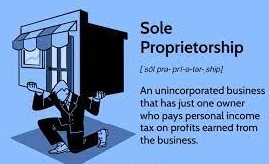Registration of Sole Proprietorship
Sole proprietorship registration is the process of officially establishing and legalizing a sole proprietorship business. While the registration requirements can vary depending on the jurisdiction, the general steps involved in sole proprietorship registration are as follows:
Choose a Business Name:
Select a name for your sole proprietorship. You can use your own legal name or a fictitious business name (also known as a trade name or “Doing Business As” or DBA name) if you want to operate under a different name. Check if the chosen name is available and not already registered or trademarked by another entity.
Business Permits and Licenses:
Determine if your business requires any specific permits or licenses to operate legally. This can vary depending on the nature of your business and the location. Research the applicable permits and licenses required for your industry and comply with the necessary regulations.
Obtain an Employer Identification Number (EIN) (if applicable):
If you plan to hire employees or if you choose to have an EIN for tax purposes, you may need to apply for an EIN from the tax authority in your country. However, as a sole proprietor, you can often use your Social Security Number (SSN) for tax reporting instead.
Register the Business Name (if applicable):
In some jurisdictions, you may need to register your business name if you choose to operate under a fictitious name or DBA. This typically involves filing a registration form and paying a fee to the appropriate government agency.
Business Registration with Government Authorities:
Depending on your jurisdiction, you may need to register your sole proprietorship with the appropriate government authorities. This typically involves completing registration forms, providing necessary information, and paying any required registration fees.
Obtain Business Insurance (if applicable):
Consider obtaining business insurance to protect yourself and your business from potential risks and liabilities. While it is not always mandatory, it is recommended to assess your insurance needs and consult with an insurance professional.
It is important to note that the specific registration requirements and procedures can vary based on your country, state, or local jurisdiction. It is advisable to consult with the local government agencies, business registration offices, or seek legal advice to understand and fulfill the specific registration requirements for your sole proprietorship in your location.
To visit- https://labourcis.nic.in/
FAQs
1. Why should I register my sole proprietorship?
- Registration provides legal recognition, helps in obtaining licenses and permits, and can enhance credibility with customers and suppliers.
2. How do I register a sole proprietorship?
- Registration usually involves choosing a business name, obtaining necessary licenses, and sometimes registering with local or state authorities.
3. Is there a fee to register a sole proprietorship?
- Yes, there may be registration fees, and costs can vary depending on your location and the licenses required.
4. Do I need a business license for a sole proprietorship?
- Yes, most sole proprietorships need a business license or permits, depending on the type of business and local regulations.
5. Can I use my name as the business name?
- Yes, you can use your legal name as the business name. If you choose a different name, you may need to register a “Doing Business As” (DBA) name.
6. Is it necessary to register with the government?
- While not always required, registering helps establish your business legally and protects your business name.
7. What are the tax implications of a sole proprietorship?
- Income from the business is reported on your personal tax return, meaning you’re taxed as an individual.
8. Can I hire employees as a sole proprietor?
- Yes, you can hire employees, but you must comply with employment laws and obtain an Employer Identification Number (EIN) if necessary.
9. What are the liabilities of a sole proprietorship?
- As a sole proprietor, you are personally liable for all business debts and obligations, meaning your personal assets could be at risk.

